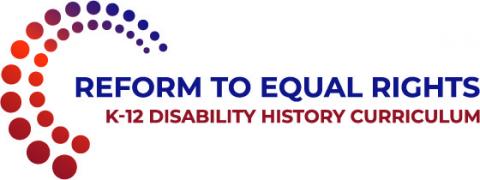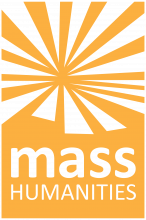Updated 07-12-2022
Link to the Reform to Equal Rights curriculum web page.
Opening in February, 2023.
A Transformative Story for Humanity
The disability rights movement has made enormous strides in the American story, going from a group whose very right to exist was questioned, to reconceptualization of the needs and rights of veterans with disabilities ... to a modern movement for full inclusion. Helping all students understand this history, key issues in the present, and possibilities in the future will improve the education of students with disabilities, and of their peers.
– Disability History and Civics Extension to the 2021 Educating for American Democracy Roadmap
Sign up to pilot materials between September, 2022 and January 2023. Details below. Free orientation for pilots September 28, 4:00-5:00pm Eastern Time.
From Reform to Equal Rights
Emerging America is pleased to announce a new project to create and disseminate the nation’s first complete K-12 Disability History Curriculum. Thanks to a Library of Congress Teaching with Primary Sources (TPS) grant, the new curriculum, From Reform to Equal Rights, will be available free online to all by February 2023. Emerging America will support implementation with teacher workshops and graduate courses. Emerging America’s free Accessing Inquiry clearinghouse website will supplement the curriculum with an expanded array of strategies and tools for inclusive teaching and learning.
Since 2010, Emerging America has dozens of primary source-focused, inquiry-based lessons and primary source sets, written by History and Special Education teachers in our graduate Accessing Inquiry courses. (Nearly 700 teachers have completed these courses.) To address a lack of usable Disability History curricula for K-12 teachers, half of the lessons that we posted to date focus on Disability History. Each lesson addresses the unique needs of its author’s students and classroom. Until now, this eclectic body of materials offered the best available option for teaching Disability History across grades in an accessible manner. Now Emerging America is happy to be able to draw upon that pool of teachers’ experience, as well as on newly available collections of primary sources and current scholarship in the field, to create a coherent set of Disability History mini-units that build across the grades. Reform to Equal Rights will be designed for application in varied settings across the nation.
How Can I Get Involved?
Pilot Draft Units
- Between September 2022 and January 2023. (Extended from spring 2022.)
- Teachers select the lessons they want to teach.
- Orientation for pilots (optional) September 28, 4:00-5:00pm Eastern Time. The session will be recorded.
- Earn 10 PDPs (Massachusetts) or a letter documenting 10 hours of participation.
Stay in Touch!
- Email Rich Cairn rcairn <@> collaborative.org to learn more and to sign up for the monthly History eNews. The eNews has a regular feature on Disability History Resources and Updates.
- Follow Emerging America on Twitter and Facebook for more frequent updates.
Complete a short survey to help Emerging America document the extent of Disability History education in the U.S. Link to the survey.
Existing Curriculum Resources
For educators who can’t wait, we encourage you to visit the Disability History Museum and to check out Emerging America’s portal: Disability History through Primary Sources. We are doubly pleased also to recommend the fabulous new Disability Awareness set of 39 essential primary sources from the Library of Congress.
What Will the Curriculum Cover?
As the project title indicates, the curriculum will trace evolving efforts across more than two centuries to strengthen support for and engagement by people with disabilities in securing necessary resources for life and work, services, and political and civil rights. The curriculum will incorporate student investigation of policy, cultural shifts, media, social change, and activism, always emphasizing the direct experiences of people with disabilities.
The curriculum will feature eight primary source and inquiry-based mini-units of two to five lessons each. Through work with teachers and with the Disability History Museum, we have found these to be areas where Disability History most closely aligns with the standard U.S. History curriculum:
- Grades K-1: Disability and Community Leadership
- Grades 2-3: Disability and Active Citizenship
- Grades 4-5: Disability, Immigration, and Citizenship
- Grades 6-8 - Civics: Civic Engagement and Government
- Grades 8-10 - U.S. History: Founding of Schools and Asylums
- Grades 8-10 - U.S. History: Impacts of the Civil War on Soldiers and Society
- Grades 9-12 - U.S. History: Institutions and Opportunities in the Progressive Era
- Grades 9-12 - U.S. History: The Long Struggle for Disability Rights
Individual lessons will feature stories from across the U.S., such as the Antebellum founding of state schools for Deaf students and for blind students. Emerging America will leverage a second grant from Mass Humanities to research and amplify the unit for grades 8-10: Who Shall Have Borne the Battle: How the Civil War Transformed Disability, Exploring Stories of Massachusetts Veterans. (See announcement.) Keene State University associate professor of history Graham Warder along with a graduate student from the UMass Amherst History Department will research and support the curriculum. The unit will feature stories of Massachusetts soldiers and nurses both famous and common. Collaboration with the Amherst-based Veterans Education Project and use of the Library of Congress Veterans History Project will strengthen connections to stories up to the present day.
An expert national advisory committee to the project identified student agency and inclusion of a multiplicity of voices as principal cross-cutting themes of the curriculum. Guidance from the Disability History and Civics Extension to the 2021 Educating for American Democracy (EAD) Roadmap helped to highlight the goal of shared stories of people with disabilities as part of the larger American story. Alignment with the EAD will continue to shape the project throughout.
Emerging America promotes Disability History both to build a more complete American story and especially as a strategy for inclusion of students with disabilities. For an extended rationale, see our earlier blog post, “Why Teach Disability History?” See also the compelling case provided by the #TeachDisabilityHistory campaign by young activists at project partner Easterseals Massachusetts.
Acknowledgments
Emerging America owes a profound debt to Laurie Block, Graham Warder, and other creators of the Disability History Museum (DHM). In close work with the DHM since 2007, we have gained immeasurably from their experience and insights about Disability History. The fully online DHM offers extensive collections of primary sources and several grades 10-12 lessons and educational essays, emphasizing 19th century U.S. history.
Reform to Equal Rights is made possible through a Teaching with Primary Sources grant from the Library of Congress.
This program is also made possible by a grant from Mass Humanities, state-based affiliate of the National Endowment for the Humanities, which provided funding through the Massachusetts Cultural Council (MCC).







